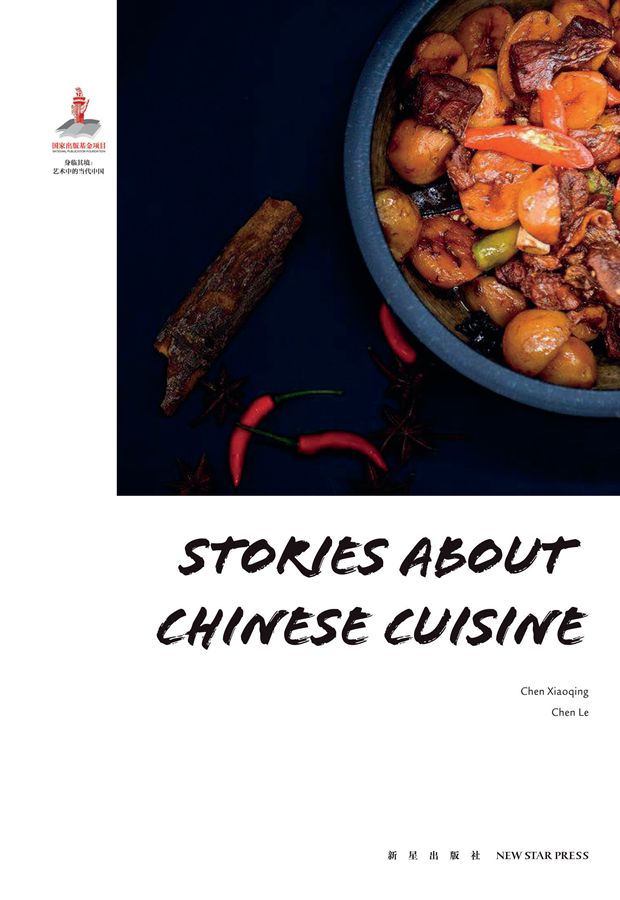CHEN Xiaoqing is known as a “street foodie.” The director of the documentary series called A Bite of China and gourmet columnist has the ability to make his readers’ mouths water through his descriptions of food.
Chen has the ability to discover unique flavors among all kinds of delicacies, regardless of whether they are served in famous restaurants or at street stands. His writing is like a kaleidoscope, which allows readers to not only see the multi-colored dishes but also smell the aroma of various foods.
Stories about Chinese Cuisine is a compilation of Chen’s gourmet columns, and his personal understanding of Chinese food and its creation process. The book includes seven chapters: Seasons, Footsteps, The Heart’s Message, Daily Domestics, Secret Realms, Encounters, and Three Meals, each representing a different perspective to narrate the stories about Chinese cuisine and its anecdotes, as well as the people who make the food.

Stories about Chinese Cuisine
Authors: Chen Xiaoqing, Chen Le
Paperback, 210 Pages
Published by New Star Press
With a long history of civilization, China has a rich culinary culture. Cuisine has become part of Chinese people’s heritage to match their diet to the seasons and keep a diversity of food options to meet the needs of distinctive palate aesthetics. In China, food is about taste as well as wisdom.
As the book discusses the relationship between Chinese people and their food, it is a window for foreigners to see into China and experience this ancient nation through its delicacies.
People’s eating habits that are formed in daily life are presented from various aspects, including their own cultural traditions, family values, life attitudes, and sentiments towards their homeland. The process of harvesting, preserving and cooking food has been recorded to inherit the memory of palate, dieting habits, traditional culture and domestic life.
“Eat the right thing in the right season” is an old saying in China. The first chapter of the book “Seasons” describes the dependence and respect Chinese people show to nature, as well as the wisdom of life that follows the cycle of the seasons in harmony with nature.
The second chapter “Footsteps” depicts a map of Chinese cuisines in different areas of the country, and links them with feature stories, reflecting Chinese people’s pursuit of a good life. There are two meanings of “footsteps.” First, it requires a long journey for the cook to prepare each ingredient. Second, food ingredients are exchanged and transported via people’s hasty footsteps, from the salt lake in Qinghai to the deep woods in Tibet Autonomous Region.
The Chinese culinary art is inexplicably mysterious. Whether deep in mountains or in the bustle of urban life, Chinese people traditionally learn how to cook primarily by following a master. This form of teaching emphasizes instinct, intuition, and inspiration. Every moment of food pleasure is, without exception, created with the heart – whether it originates in ancestral wisdom, in closely guarded secrets within families, between masters and apprentices, or in a gourmet’s empirical findings. This legacy of pleasure has been handed down from generation to generation. These secrets have been recorded in “The Heart’s Message.”
“Daily Domestics” looks at those commonly seen home-made dishes which are loved by families. They include a myriad of dishes, such as knife-shaved noodles, braised pork in brown sauce, Sichuan pickles, Tian-men steamed dishes, watermelon paste, cattail dumplings, and Macao dessert.
Most delicacies are a combination of various ingredients blended together to create a refreshing flavor that people may never have tasted before. Food carnivals often reflect the melting pot of different people, who bring their own ingredients together and cook large meals. “Secret Realms” discovers culinary treasures hidden nationwide in forests, mountains, rivers, lakes, sea, prairies or even deserts.
Though “three meals a day” has almost become a dietary pattern generally shared by humanity as a whole, it has varied to form different life rhythms and evoke different feelings. It is human instinct to pursue delicacies, but people may have completely different preferences. Tianjin pancake rolled with a crisp fritter, Chongqing noodles, Guangzhou morning tea, Hunan salted duck eggs, boiled meat of the Yi ethnic minority, all these delicious dishes have their own stories. Just as some prefer meat while others are vegetarians, some seek success while others prefer the tranquility of a simple life.
Each chapter of the book not only discusses food, but treats it as a way to rediscover Chinese culture. This traditional culture and the Chinese people behind these stories are what the author seeks to present to the audience.
